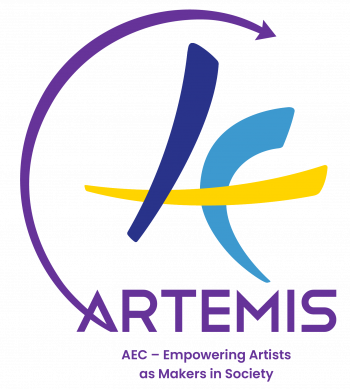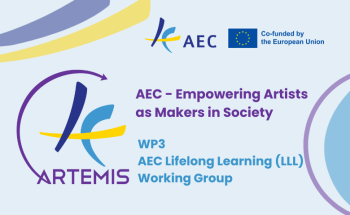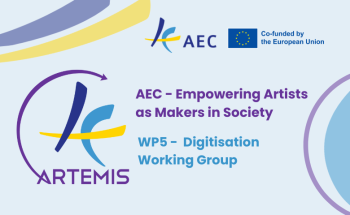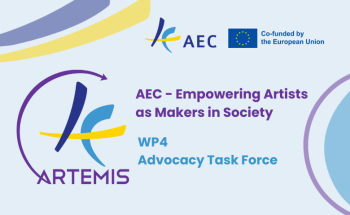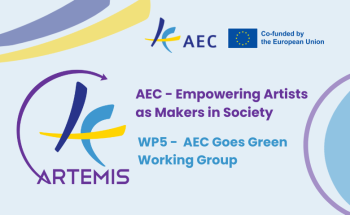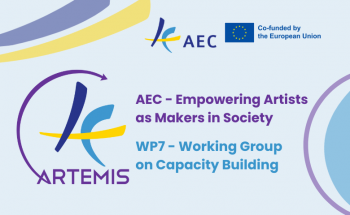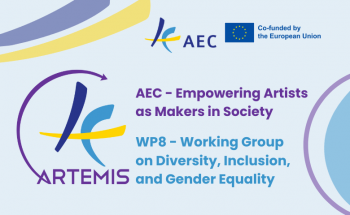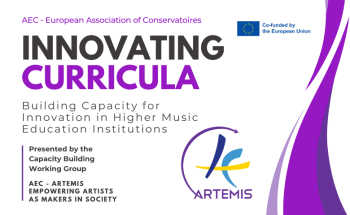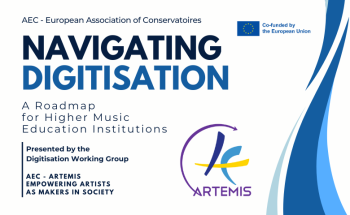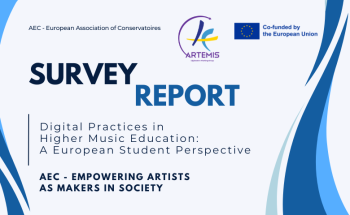Meet the ARTEMIS Steering Committee
Members
- Deborah KELLEHER, Royal Irish Academy of Music, Dublin, Ireland (AEC Executive Committee)
- Elisabeth GUTJAHR, Mozarteum University, Salzburg, Austria (AEC Executive Committee)
- Jan-Gerd KRÜGER, Prince Claus Conservatoire, Groningen, The Netherlands (WG Chair)
- Esther VIÑUELA, Escuela Superior de Música Reina Sofía, Madrid, Spain (WG Chair)
- Dušanka JELENKOVIĆ, independent researcher, Belgrade, Serbia (WG Chair)
- Sandrine DESMURS, Cefedem Auvergne Rhône-Alpes, Lyon, France (WG Chair)
- Martin PRCHAL, Royal Conservatoire The Hague, The Hague, The Netherlands (WG Co-chair)
- Lies COLMAN, Royal Conservatoire The Hague, The Hague, The Netherlands (WG Co-chair)
- Katja THOMSON, Sibelius Academy, University of the Arts, Helsinki, Finland (WG Chair)
- AEC Office Team (OT) Coordinators
Goals
- Managing the project
- Monitoring, internal evaluation and ensuring the implementation of the cross-cutting and transversal priorities
- External evaluation
- Reporting on the project to the EACEA
Updates
To undertake the current evaluation of the ARTEMIS Project, a team of four higher education professionals was employed by MusiQuE (Music Quality Enhancement), an independent agency which works internationally to uphold and advance the quality of music education.
The individuals and their affiliations are:

Dr. Robert Cutietta, Chair
Professor: The Thornton School of Music The University of Southern California Los Angeles, California. United States of America

Lamberto Coccioli
Associate Principal & Professor of Music and Technology Royal Birmingham Conservatoire Birmingham City University Birmingham, United Kingdom

Aygül Gunaltay
Chair of Music Department Istanbul University State Conservatory (until 2019) Istanbul, Turkey

Dr. Rineke Smilde
Professor of Lifelong Learning in Music Prince Claus Conservatoire Hanze University of Applied Sciences Groningen (until 2023) Groningen, Netherlands Professor of Music Education University of Music and Performing Arts Vienna, Austria (until 2021)
Each member was tasked with evaluating the current progress of specific Working Groups. Their data gathering was conducted through reading the written reports of the Working Groups, interviews with Working Group or Task Force leaders, and participation in meetings and/or sessions organised by the Working Groups. Each member prepared written reports which were submitted to the Chair for synthesis into this report. All evaluations were conducted in the Fall of 2023.
The Project is clear on the target groups to both undertake and benefit from the endeavour. This can be envisioned in their identification of three Target Groups. The first group is made up of individuals within the profession who are actively participating in the tasks of the Project. The second group is the collegiate music education profession at large. The third group is a wider audience outside of the immediate profession. As such, it is clear that the Project’ objectives are specific, measurable, achievable, and time bound. The project objectives are achieved through a consistent and coherent set of activities. Project target groups are clearly defined and within reach.

